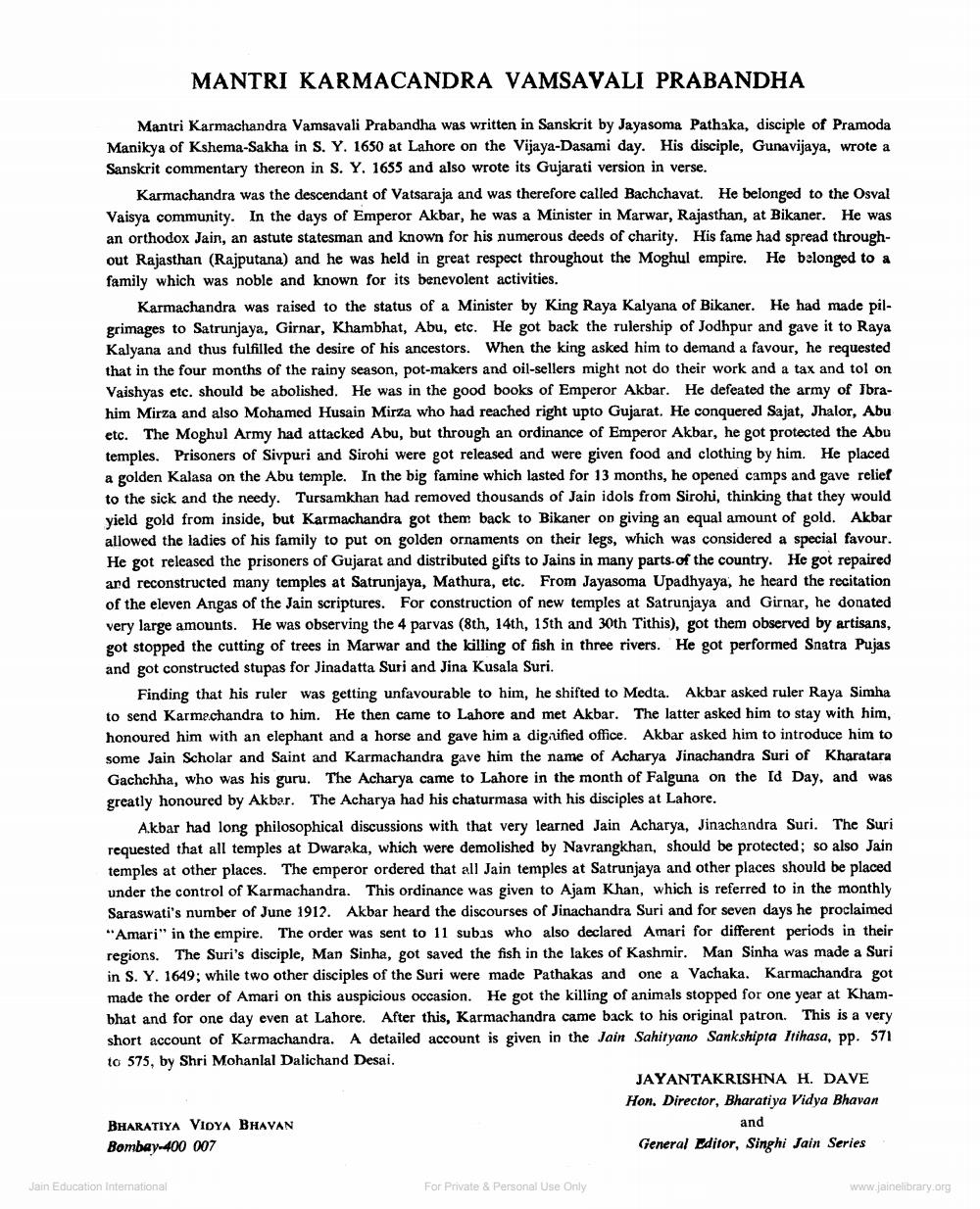Book Title: Mantri Karmchandra Vanshavali Prabandh Author(s): Jinvijay Publisher: Bharatiya Vidya Bhavan View full book textPage 9
________________ MANTRI KARMACANDRA VAMSAVALI PRABANDHA Mantri Karmachandra Vamsavali Prabandha was written in Sanskrit by Jayasoma Pathaka, disciple of Pramoda Manikya of Kshema-Sakha in S. Y. 1650 at Lahore on the Vijaya-Dasami day. His disciple, Guna vijaya, wrote a Sanskrit commentary thereon in S. Y. 1655 and also wrote its Gujarati version in verse. Karmachandra was the descendant of Vatsaraja and was therefore called Bachchavat. He belonged to the Osval Vaisya community. In the days of Emperor Akbar, he was a Minister in Marwar, Rajasthan, at Bikaner. He was an orthodox Jain, an astute statesman and known for his numerous deeds of charity. His fame had spread throughout Rajasthan (Rajputana) and he was held in great respect throughout the Moghul empire. He belonged to a family which was noble and known for its benevolent activities. Karmachandra was raised to the status of a Minister by King Raya Kalyana of Bikaner. He had made pilgrimages to Satrunjaya, Girnar, Khambhat, Abu, etc. He got back the rulership of Jodhpur and gave it to Raya Kalyana and thus fulfilled the desire of his ancestors. When the king asked him to demand a favour, he requested that in the four months of the rainy season, pot-makers and oil-sellers might not do their work and a tax and tol on Vaishyas etc. should be abolished. He was in the good books of Emperor Akbar. He defeated the army of Ibrahim Mirza and also Mohamed Husain Mirta who had reached right upto Gujarat. He conquered Sajat, Jhalor, Abu etc. The Moghul Army had attacked Abu, but through an ordinance of Emperor Akbar, he got protected the Abu temples. Prisoners of Sivpuri and Sirohi were got released and were given food and clothing by him. He placed a golden Kalasa on the Abu temple. In the big famine which lasted for 13 months, he opened camps and gave relief to the sick and the needy. Tursamkhan had removed thousands of Jain idols from Sirohi, thinking that they would yield gold from inside, but Karmachandra got them back to Bikaner on giving an equal amount of gold. Akbar allowed the ladies of his family to put on golden ornaments on their legs, which was considered a special favour. He got released the prisoners of Gujarat and distributed gifts to Jains in many parts of the country. He got repaired and reconstructed many temples at Satrunjaya, Mathura, etc. From Jayasoma Upadhyaya, he heard the recitation of the eleven Angas of the Jain scriptures. For construction of new temples at Satrunjaya and Girnar, he donated very large amounts. He was observing the 4 parvas (8th, 14th, 15th and 30th Tithis), got them observed by artisans, got stopped the cutting of trees in Marwar and the killing of fish in three rivers. He got performed Snatra Pujas and got constructed stupas for Jinadatta Suri and Jina Kusala Suri. Finding that his ruler was getting unfavourable to him, he shifted to Medta. Akbar asked ruler Raya Simha to send Karmechandra to him. He then came to Lahore and met Akbar. The latter asked him to stay with him, honoured him with an elephant and a horse and gave him a dignified office. Akbar asked him to introduce him to some Jain Scholar and Saint and Karmachandra gave him the name of Acharya Jinachandra Suri of Kharatara Gachchha, who was his guru. The Acharya came to Lahore in the month of Falguna on the Id Day, and was greatly honoured by Akbar. The Acharya had his chaturmasa with his disciples at Lahore. Akbar had long philosophical discussions with that very learned Jain Acharya, Jinachandra Suri. The Suri requested that all temples at Dwaraka, which were demolished by Navrangkhan, should be protected; so also Jain temples at other places. The emperor ordered that all Jain temples at Satrunjaya and other places should be placed under the control of Karmachandra. This ordinance was given to Ajam Khan, which is referred to in the monthly Saraswati's number of June 1912. Akbar heard the discourses of Jinachandra Suri and for seven days he proclaimed "Amari" in the empire. The order was sent to 11 subas who also declared Amari for different periods in their regions. The Suri's disciple, Man Sinha, got saved the fish in the lakes of Kashmir. Man Sinha was made a Suri in S. Y. 1649; while two other disciples of the Suri were made Pathakas and one a Vachaka. Karmachandra got made the order of Amari on this auspicious occasion. He got the killing of animals stopped for one year at Khambhat and for one day even at Lahore. After this, Karmachandra came back to his original patron. This is a very short account of Karmachandra. A detailed account is given in the Jain Sahityano Sankshipta Itihasa, pp. 571 to 575, by Shri Mohanlal Dalichand Desai. JAYANTAKRISHNA H. DAVE Hon. Director, Bharatiya Vidya Bhavan BHARATIYA VIDYA BHAVAN and Bombay-400 007 General Editor, Singhi Jain Series Jain Education International For Private & Personal Use Only www.jainelibrary.orgPage Navigation
1 ... 7 8 9 10 11 12 13 14 15 16 17 18 19 20 21 22 23 24 25 26 27 28 29 30 31 32 33 34 35 36 37 38 39 40 41 42 43 44 45 46 47 48 49 50 51 52 53 54 55 56 57 58 59 60 61 62 63 64 65 66 67 68 69 70 71 72 73 74 75 76 77 78 79 80 81 82 83 84 85 86 87 88 89 90 91 92 ... 122
